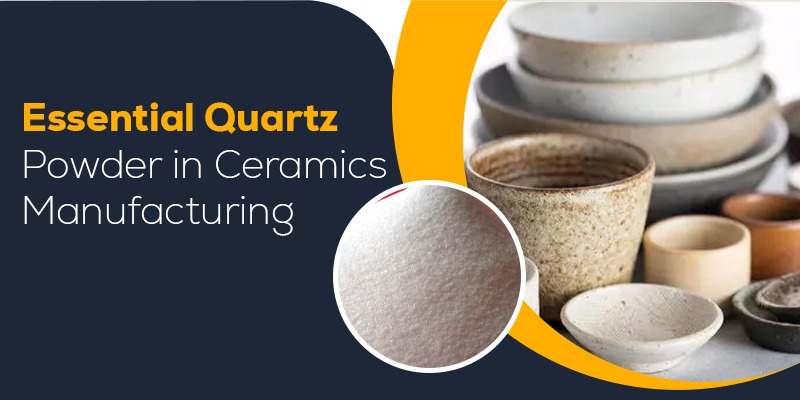
Essential Quartz Powder in Ceramics Manufacturing
Quartz powder is one of the most commonly utilized raw materials in ceramics, and for good reason! When it comes to strength, stability, and the best finish, quartz powder in ceramic's manufacturing has the most important basic starting point. Quartz is primarily made of silicon dioxide (SiO₂), which is a well-known mineral and has many advantages, including hardness, heat resistance, and chemical stability.
When mixed with other raw materials like clay or feldspar, quartz powder contributes to the structural integrity of ceramic products. It helps minimize deformity during firing, but more importantly, it enhances durability and surface smoothness of the final product.
How does quartz powder improve the quality of ceramics?
We get asked this question by manufacturers and ceramic designers on a regular basis. The answer is found in the physical and chemical nature of quartz. Quartz powder in ceramics making is beneficial in a number of ways. It provides thermal stability, reduces shrinkage, and provides a fine texture to ceramic bodies. The result is that ceramic tiles, sanitary ware and tableware will resist cracking, scratching, and weathering.
In addition, the use of quartz helps ensure good mixing due its small particle size. This means that every item in the new batch of ceramics will look the same and have the same strength. Ultimately, you will have a quality ceramic product that was created with high performance and professional-quality finishes.
In what types of ceramic products is quartz powder used?
You’ll find quartz powder in ceramics manufacturing nearly all major product categories:
- Ceramic Tiles: Enhances mechanical strength and surface brightness
- Sanitary Ware: Provides structural support and chemical resistance
- Porcelain and Tableware: Adds translucency, gloss, and heat resistance
- Technical Ceramics: Essential in electronic and industrial components
No matter the application, quartz powder ensures that the ceramic material can withstand everyday use and environmental stressors while maintaining a refined appearance.
How much quartz powder is usually used in ceramic production?
The proportion of quartz powder used in ceramics manufacturing will be specific to the product type and the formulation of the manufacturer. Generally quartz powder will constitute a percentage range between 15 and 35% of the ceramic body composition, but more quartz content will be recommended in products where the aim is to obtain greater mechanical strength and greater resistance to heat and wear, but the ratio with other materials like kaolin and feldspar must also be calculated in order to maintain the desired properties in the ceramic during firing and cool down.
Quartz powder with a consistent grain size and high purity should be used throughout the product so it will mix well with other materials and will not adversely affect the performance of the ceramic body.
What should you look for when choosing quartz powder for ceramics?
Choosing the right quartz powder can make a big difference in your production quality. Here are key features to consider:
- High Purity (above 99% SiO₂)
- Low Moisture Content
- Consistent Particle Size Distribution (200–325 mesh is common)
- Minimal Impurities (especially low in iron and other trace metals)
Quality control is very important in ceramics. A poor-quality batch of quartz will result in a ceramic sheet with surface blemishes, color variation, and situations where the ceramic fails in the firing process. Good suppliers will always provide technical data sheets and test data so you can ensure you are using quality quartz powder in your ceramics production.
Conclusion
Quartz powder for ceramic manufacturing is an essential ingredient that brings the perfect mix of durability, accuracy, and beauty to all kinds of ceramic products. The role of quartz powder is essential throughout the manufacturing process, including requiring less thermal shock to enhancing finish and texture. Whether you are making beautiful tabletop ceramics or tough industrial ceramics, quartz powder can help you meet better performance and design criteria. Quartz powder is the true and silent support of many of the ceramic products we see on a daily basis.